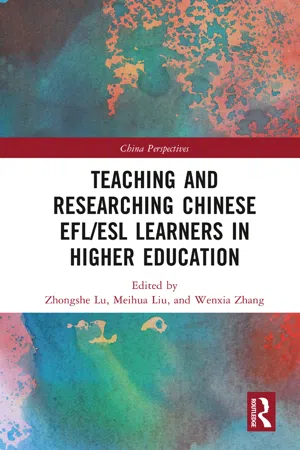
Teaching and Researching Chinese EFL/ESL Learners in Higher Education
- 322 pages
- English
- ePUB (mobile friendly)
- Available on iOS & Android
Teaching and Researching Chinese EFL/ESL Learners in Higher Education
About this book
China has attached great importance to teaching students to become proficient users of English. Yet, despite a plethora of studies and practice on Chinese ESL/EFL (English as a second/foreign language) learners, the large student population, its complicated composition and the complex nature of second and foreign language learning have rendered it difficult to offer a panoramic view on ESL/EFL teaching and learning of Chinese learners.
This book provides a new and up-to-date perspective on the teaching and learning of Chinese ESL/EFL learners. The book collects 15 case studies, falling into two parts—Curriculum Development and Teaching Practice and Skills-Based Research. The collected studies deploy qualitative, quantitative or mixed methods to explore patterns, features, developments and causes and effects of a variety of issues in the sphere of ESL/EFL teaching and learning. Moreover, the cases offer insights that are relevant beyond the mainland Chinese context such as Hong Kong, Macau, Britain and Australia.
Students and scholars of TESOL and applied linguistics will be interested in this title.
Frequently asked questions
- Essential is ideal for learners and professionals who enjoy exploring a wide range of subjects. Access the Essential Library with 800,000+ trusted titles and best-sellers across business, personal growth, and the humanities. Includes unlimited reading time and Standard Read Aloud voice.
- Complete: Perfect for advanced learners and researchers needing full, unrestricted access. Unlock 1.4M+ books across hundreds of subjects, including academic and specialized titles. The Complete Plan also includes advanced features like Premium Read Aloud and Research Assistant.
Please note we cannot support devices running on iOS 13 and Android 7 or earlier. Learn more about using the app.
Information
Part I
1 Feedback and doctoral student writing
Introduction
Supervisor feedback on doctoral student writing
Examiner feedback on doctoral student writing
Table of contents
- Cover
- Half Title
- Series Page
- Title Page
- Copyright Page
- Contents
- List of figures
- List of tables
- Preface
- List of abbreviations
- List of contributors
- PART I: Curriculum development and classroom teaching
- PART II: Skills-based research
- Index